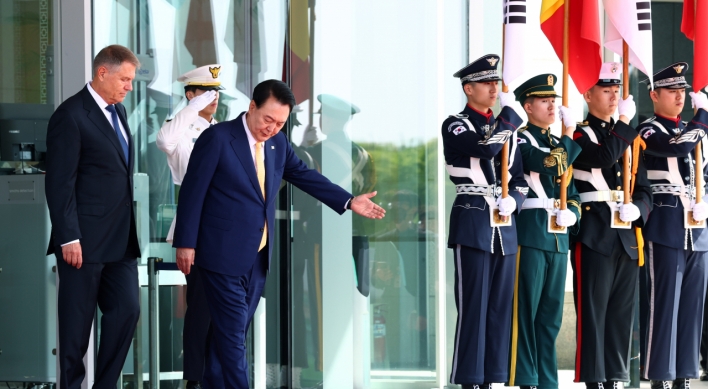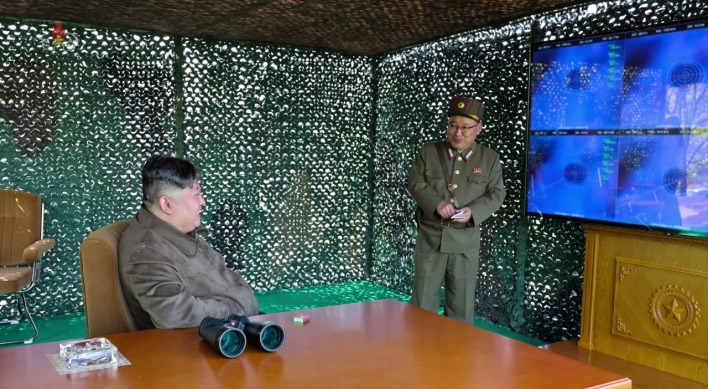[Contribution] Climate change: considering history and future challenges
By Korea HeraldPublished : April 28, 2021 - 13:32

What year did Korea have the most rain? The answer is 1821, in the 21st year of the reign of King Sunjo of the Joseon Dynasty. How did we know this? Korea invented a rain gauge called Cheugugi to measure and record rainfall from 1441, in the 23rd year of the reign of King Sejong. Measuring the rainfall was discontinued for a while due to Japanese and Chinese invasions of Korea, but it resumed in 1770 during the reign of King Yeongjo. Historic rainfall records spanning 130 years from 1777 to 1907 still remain up to date. These records are the envy of world-renowned climatologists.
According to the Veritable Records of the Joseon Dynasty, Seoul had 311.5 mm of rain for five days from June 1, 1821 in the lunar calendar. This amount is almost equivalent to the total rainfall during the summer monsoon season. The rain continued until July 22, resulting in 39 days of rain and 1,869.5 mm of rainfall. In the same year, the annual rainfall amounted to 2,566 mm. The records even show that the government performed rituals to stop the rain. The second highest rainfall was also measured by Cheugugi. The third highest precipitation was 2,355.5 mm in 1990, in the modern age of meteorological observation.
Western-style modern observatories were set up in 1904 in Incheon, Mokpo, and Busan. In 1912, Seoul, Gangneung, and Daegu also came to have weather observatories, resulting in a total of six observatories in Korea. Since then, except for three years during the Korean War, meteorological records of snow, atmospheric pressure, rain, and other phenomena have been kept every single day for over 110 years from 1907 to the present. Korea now has 240 years of unbroken data on meteorological conditions.
In recent days, heatwaves, heavy torrential rain, and other extreme weather events occur more often and with more intensity due to climate change. Last year, Korea experienced its longest rainy season, and the average monthly temperature in June was higher than in July. The winter from December 2020 to February 2021 recorded the second largest temperature variation since 1973.
Let’s look at the climate conditions we have felt in the last 10 years from 2011 to 2020. With increased temperatures in summer, the number of heatwave days has risen since the 2001-2010 period to an average of 5.3 days. At the same time, the lowest temperature in winter also dropped. Compared with the last decade, the number of cold spell days and days with temperature below freezing increased by 0.5 and 1.5 days, respectively.
Temperatures are rising faster than ever. The average temperature from the 1910s to the 1980s increased by 1 degree Celsius, and went up again by 0.9 C until the 2010s. This shows that a one-degree rise took 80 years in the past, but it took only 40 years for the next one-degree increase. The early start of each season shows how fast climate change is happening. Climatically, from 1912 to 1940, summer season started on June 11, but over the last three decades from 1991 to 2020, the start of summer has advanced to May 31. Accordingly, beaches in Korea open earlier for the summer season.
The temperature of the planet has increased only by 1 C, but the world climate is already in chaos. Last summer, Verkhoyansk, a Siberian town in Russia, reported a record-breaking temperature of 38 C and a high of 54 C was recorded in California’s Death Valley. Last winter, on the other hand, 73 percent of the US was covered with snow along with an extreme cold wave. These are only examples of the extreme weather events the world has experienced. There have been so many extreme weather events that they cannot be listed one by one.
Recently, scientists from the World Climate Research Program have emphasized that the impacts of climate change have the potential to be as abrupt and far-reaching as the current COVID-19 pandemic. This is a warning that if we do not address climate change right now, we could face an unprecedented disaster that cannot be fixed. To respond to climate crisis together with countries around the world, we should focus on achieving a common goal: becoming carbon neutral by 2050. If we let this chance pass us by, it may never come again.
Park Kwang-suk is the administrator of the Korea Meteorological Administration. -- Ed
According to the Veritable Records of the Joseon Dynasty, Seoul had 311.5 mm of rain for five days from June 1, 1821 in the lunar calendar. This amount is almost equivalent to the total rainfall during the summer monsoon season. The rain continued until July 22, resulting in 39 days of rain and 1,869.5 mm of rainfall. In the same year, the annual rainfall amounted to 2,566 mm. The records even show that the government performed rituals to stop the rain. The second highest rainfall was also measured by Cheugugi. The third highest precipitation was 2,355.5 mm in 1990, in the modern age of meteorological observation.
Western-style modern observatories were set up in 1904 in Incheon, Mokpo, and Busan. In 1912, Seoul, Gangneung, and Daegu also came to have weather observatories, resulting in a total of six observatories in Korea. Since then, except for three years during the Korean War, meteorological records of snow, atmospheric pressure, rain, and other phenomena have been kept every single day for over 110 years from 1907 to the present. Korea now has 240 years of unbroken data on meteorological conditions.
In recent days, heatwaves, heavy torrential rain, and other extreme weather events occur more often and with more intensity due to climate change. Last year, Korea experienced its longest rainy season, and the average monthly temperature in June was higher than in July. The winter from December 2020 to February 2021 recorded the second largest temperature variation since 1973.
Let’s look at the climate conditions we have felt in the last 10 years from 2011 to 2020. With increased temperatures in summer, the number of heatwave days has risen since the 2001-2010 period to an average of 5.3 days. At the same time, the lowest temperature in winter also dropped. Compared with the last decade, the number of cold spell days and days with temperature below freezing increased by 0.5 and 1.5 days, respectively.
Temperatures are rising faster than ever. The average temperature from the 1910s to the 1980s increased by 1 degree Celsius, and went up again by 0.9 C until the 2010s. This shows that a one-degree rise took 80 years in the past, but it took only 40 years for the next one-degree increase. The early start of each season shows how fast climate change is happening. Climatically, from 1912 to 1940, summer season started on June 11, but over the last three decades from 1991 to 2020, the start of summer has advanced to May 31. Accordingly, beaches in Korea open earlier for the summer season.
The temperature of the planet has increased only by 1 C, but the world climate is already in chaos. Last summer, Verkhoyansk, a Siberian town in Russia, reported a record-breaking temperature of 38 C and a high of 54 C was recorded in California’s Death Valley. Last winter, on the other hand, 73 percent of the US was covered with snow along with an extreme cold wave. These are only examples of the extreme weather events the world has experienced. There have been so many extreme weather events that they cannot be listed one by one.
Recently, scientists from the World Climate Research Program have emphasized that the impacts of climate change have the potential to be as abrupt and far-reaching as the current COVID-19 pandemic. This is a warning that if we do not address climate change right now, we could face an unprecedented disaster that cannot be fixed. To respond to climate crisis together with countries around the world, we should focus on achieving a common goal: becoming carbon neutral by 2050. If we let this chance pass us by, it may never come again.
Park Kwang-suk is the administrator of the Korea Meteorological Administration. -- Ed
-
Articles by Korea Herald



![[AtoZ into Korean mind] Humor in Korea: Navigating the line between what's funny and not](http://res.heraldm.com/phpwas/restmb_idxmake.php?idx=644&simg=/content/image/2024/04/22/20240422050642_0.jpg&u=)



![[Herald Interview] Why Toss invited hackers to penetrate its system](http://res.heraldm.com/phpwas/restmb_idxmake.php?idx=644&simg=/content/image/2024/04/22/20240422050569_0.jpg&u=20240422150649)

![[Graphic News] 77% of young Koreans still financially dependent](http://res.heraldm.com/phpwas/restmb_idxmake.php?idx=644&simg=/content/image/2024/04/22/20240422050762_0.gif&u=)






![[Exclusive] Korean military to ban iPhones over security issues](http://res.heraldm.com/phpwas/restmb_idxmake.php?idx=652&simg=/content/image/2024/04/23/20240423050599_0.jpg&u=)



